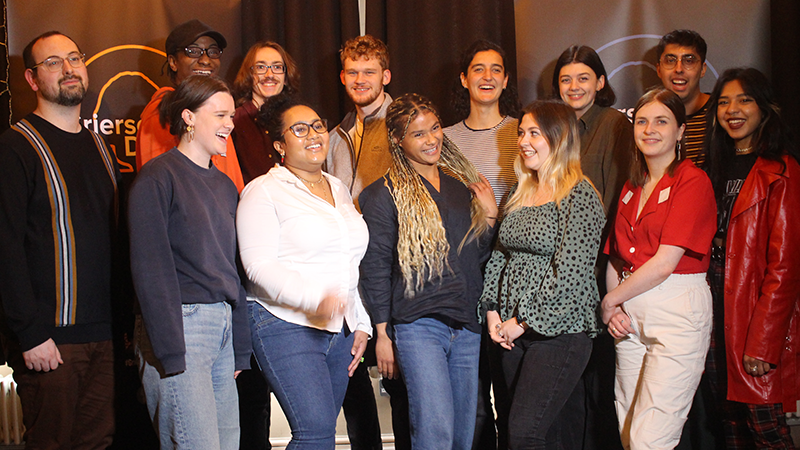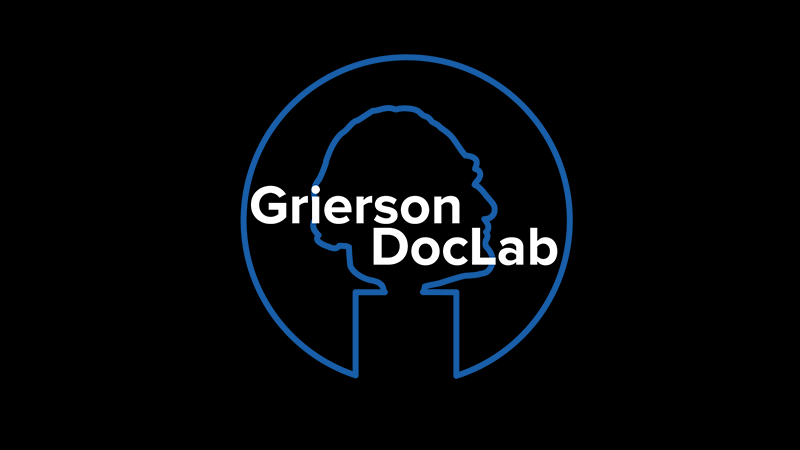June 08, 2022
Hear from the trainees about their experience of the online training and trip to Birmingham
Our 13 2022 Grierson DocLab core trainees embarked on intensive online training and in-person sessions in Birmingham throughout May. Read on to find out how they got on...
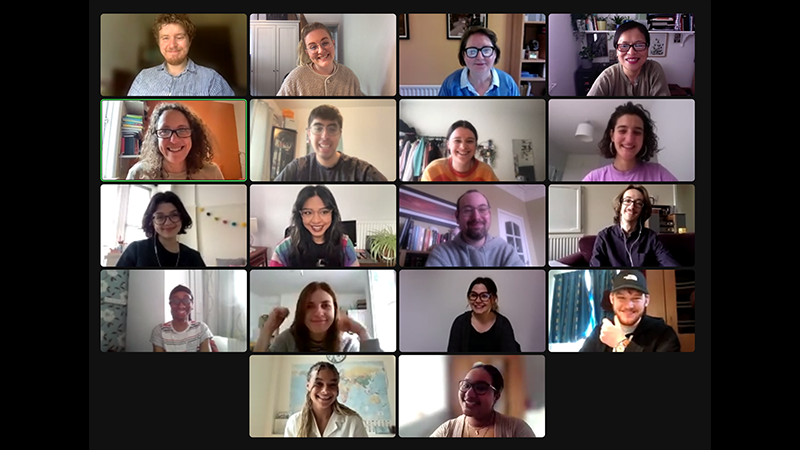
2022 Grierson DocLab trainees in online training, with lead trainer, Carol Nahra and Grierson team members.
Online
Monday
Becky Cudmore
It has arrived. Grierson day one is finally here... Better get some coffee ready.
We met at 8:45 for a coffee and chat in small groups, most of this morning was filled with anxiousness, excitement, and readiness. Back in the Zoom room we met with Lorraine Heggessey, who gave us a warm welcome to the scheme and top tips for the industry.
First task: A Menti, which anonymously asked us how we were feeling. Again, anxiety and excitement were the top two. The cohort then discussed what they were looking for from the week, which arrived like a glorious entrée filled with ideas and hopes.
We then met our trainer Carol, who gave us an insight into her career and an introduction into the television and documentary industry touching on the differences in UK and American broadcasting.
Next, Emma Cooper, our first fantastic speaker. She discussed in detail about her career, where she started and how she’s now thriving in her very own company: Empress. With her new documentary recently out on Netflix she took us through the excitement of seeing her work on a billboard in Times Square. Emma noted on the fun in TV and tips to succeed but also the hardships that come with that wanted success. Such an informative talk.
We then retreated away from our desks and took a step into brave outdoors in search of a sandwich...
Frazer McLean
After lunchtime was over and I had just prepared my second flask of coffee of the day, it was time for us to cover different formats and categories of factual content. How did I learn more about this in this two-hour session than I did in 3 years of university? It really felt like everything was falling into place and I had really gained a lot more understanding of the factual industry and how it operates.
After this taught session, we split into smaller groups and had conversations about two of the films we had been tasked with watching, Lift and Missed Call, and this was one of my favourite parts of the whole day. My group all had different opinions on the two films, and we had a great conversation about how we felt about them both and even incorporated some of the knowledge we had just learned about in the format session to see how the films attempted to reach their audiences.
After this conversation, it was time to wrap up Grierson DocLab day one, possibly the most packed day of learning I’ve ever had the opportunity to take part in. I felt so hopeful about the rest of the week!
Tuesday
Mariam Aliabadi
Back on Zoom for day 2 of DocLab! I’m still pinching myself that I get to spend the whole week watching and talking about documentaries and hearing from so many inspiring people.
We started off with a clip that Becky, who studied wildlife documentary (so cool), chose from Orlando von Einsiedel’s film Virunga as her favourite scene from a documentary. I loved hearing everyone’s views on what made it an important and powerful clip. Such thoughtful and rich discussion – Hasan’s face says it all.
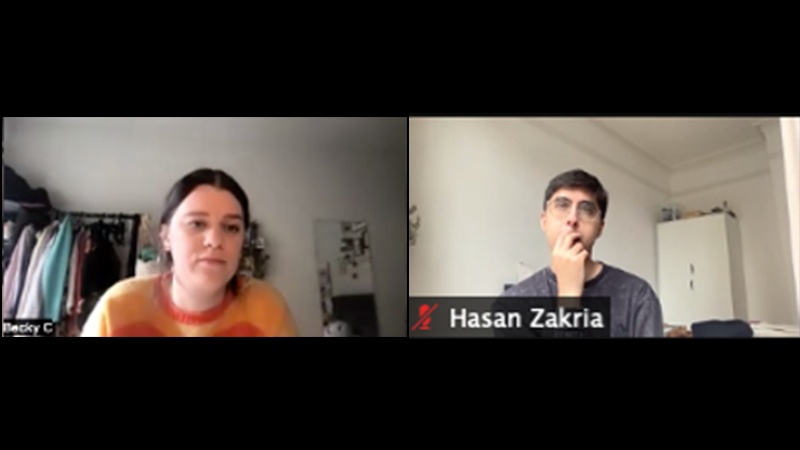
We went on to explore another form of the documentary subgenre: longitudinal docs. We spoke about the Seven Up! films and the ins and outs of producing a series like that. It’s such a privilege learning from Carol – she has endless knowledge of documentaries and has spoken to every notable documentary director or producer under the sun about how they made their films and why.
In the 5-minute break before the pitching session, I scramble for a quick drink of water. Frazer has the right idea.
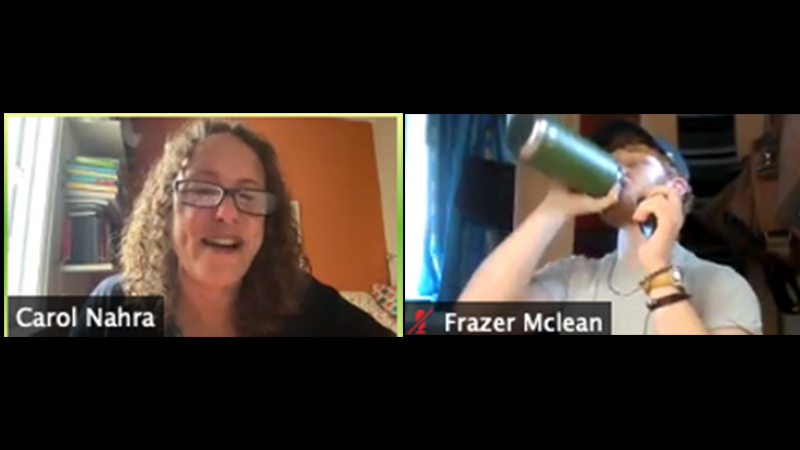
Deep dive into pitching! The only thing I’ve ever pitched is a tent so I’m feeling a little out of my depth here. Carol breaks it down for us by getting us to watch two short clips and now pitching takes on a whole new meaning.
We watched one of my filmmaking heroes, Victoria Mapplebeck’s pitch to IDFA for her most recent film. I was blown away by her bravery in being so vulnerable and so authentically herself whilst at the same time exuding authority, confidence, and trust. Top takeaway? Shoot a minute a day on your phone, you never know when that footage might come in handy! It’s also a brilliant, and cheap, way to develop your shooting skills.
Jyoti Rajput
After a much-needed lunch time nap (the best pro of working from home, obviously), the intensity of the morning program continues into the afternoon. Carol, our amazing trainer, resumes the training on different documentary subgenres. Today we focus on the use of animation in documentaries. I found this quite interesting as I had never really investigated many animated documentaries before. However, now I have a whole list of recommendations to get through, from everyone’s suggestions! (The list is ever-growing this week…) It was great to develop an appreciation of how animation can broaden approaches to filmmaking when the events either could not be filmed, should not be filmed due to the risk of aestheticising suffering, or where animation works to convey story and setting more effectively.
Following that, we were split into pairs and did an exercise to help with the development process. We each took our ideas and worked with a partner to create three different formats and approaches for this idea. This was a fantastic exercise to do to start exploring the multitude of avenues you can take, just from one concept. I found this useful, as it was a good exercise to become familiar with and consolidate all the lingo, as well as test out why some approaches work better than others for a certain idea. After presenting these ideas to another pair, we all came together to share as a group.
I was happy to have a break at this point as the exercise was challenging and I needed to soak in all the information. Next, we are all excited to hear from our speaker: Meg Hughes a Junior Production Manager at Blast! Films. Meg kindly took some time out of her busy, busy schedule to give us all an insight into the world of production management and how they work with editorial to make the film. I learned about the imperativeness of production management. Without production management, no films would ever get made! At the risk of sounding like broken record, this was extremely useful – like everything else through the training so far! Especially as I had never considered this route before, it gave me something to think about. I had never realised that it can have creative elements too. Meg was absolutely inspiring to listen to and gave us invaluable tips on the job-hunting process. Not only was it useful but also engaging and hearing all her wild stories and anecdotes was heartening.
We reconvene as a group and have a little debrief of the day. It’s only the second day but I feel I have learned so much and can’t wait to learn more. Every single minute so far has been so beneficial, and I can’t thank Yen, Carol, Hannah, Joseph, and Jane enough for creating a training week so well thought-out. I don’t know about anyone else, but I was simultaneously shattered yet stimulated digesting all the information. Let’s just say that I slept like a baby that night. Roll on Wednesday!
Wednesday
Neil Aitken
By Wednesday of DocLab, we had really started to get to know one another and feel comfortable discussing our pitches, ideas, and any thoughts we had as we went on this journey of discovery together. As such, in our morning breakout rooms the conversation flowed freely as we discussed how we were all feeling and how we had been finding DocLab so far. All of us radiated positivity and enthusiasm and shared in our eager anticipation to hear what that day’s guest speaker – Kate Quine of 72 Films – had to say to us.
Before Kate’s presentation, Carol led us through a discussion involving documentary formats such as light constructs. This helped me to think about how different formats might suit my own idea and whether applying them would add to my concept. We also discussed more ideas around the pitching process, namely the purpose of our programmes, what themes they addressed, who they might be targeted at, and where might be an appropriate platform for them to be shown. All of this gave us much food for thought and made us really interrogate our pitch ideas and hopefully refine them.
Kate’s presentation and subsequent discussion was the highlight of the day. Her anecdotes about the making of programmes such as The Trump Show and A Dangerous Dynasty: House of Assad not only deepened my appreciation for these documentaries, but also provided fascinating insight into the production process, how archive footage can be utilised, and how the editing process functions to create a compelling narrative. As usual, our group had many questions for her, and I even managed to get one of my own in!
In the afternoon we were tasked with individually researching different production companies and feeding back to the group in breakout rooms. I was given Lightbox, a company which I had not heard of before but which I found out has produced many critically acclaimed docs, such as Searching for Sugarman and Man on Wire (a favourite of mine). It was so interesting hearing about the other companies that people had researched and considering how each one had different content and areas they leaned more towards but which they, at times, deviated from.
Also in the afternoon, it was my turn to introduce a clip from a documentary I like. My choice, The Imposter, was received very warmly by the group, which helped to ease my nerves when discussing why I enjoyed the film so much. The warmth and enthusiasm of the group when discussing each other’s film choices has been so appreciated, and really helps to create a welcoming, enjoyable atmosphere in which ideas and opinions can be expressed without fear or anxiety. This same atmosphere carried on to our breakout group sessions later in the day, where we discussed our pitch ideas. It is so gratifying to have such support and encouragement from the group, and the feedback given was nothing but constructive, helpful, and reassuring. I left Wednesday’s session feeling motivated, positive, and excited for the rest of the week!
Sarah Russell
Morning coffee at the ready, Carol launched us into another of her Docu-Masterclasses, this time looking towards broadcasters’ commissioning outlines. We came up with three key points, which will help us with our own pitches later this month:
- Purpose: What universal themes are being addressed? Why do we need this show, and why now?
- Generating story: How can we unpack personal stories in a natural way? Can a light construct help?
- Invitation: Is the programme set in a space that viewers want to be in?
We then met the brilliant Kate Quine from 72 Films, series producer of The Trump Show and A Dangerous Dynasty: House of Assad. We covered the pros and cons of using archive, from accessing rushes to fair dealing and fees. I’m now feeling very grateful for LinkedIn after finding out that she secured her first job from scouring the Yellow Pages!
For the remainder of the morning, we discussed subgenres of documentary, from musicals like Feltham Sings to docudrama re-enactments such as The Arbor. Day three and my watchlist was already two miles long.
Then off we went on our lunch and research leave, as we were each assigned an indie production company – out of those where our placements will be completed (!) – to report back on. We shared our findings in breakout rooms, learning about the different outputs, ethos, and passion projects that make up each company.
We finished Wednesday off with some work on our own pitch ideas in breakout rooms, with Carol popping in for advice. The sense of support and quality of feedback from the group has been brilliant, and watching each concept take shape is already incredibly exciting. Roll on day four!

